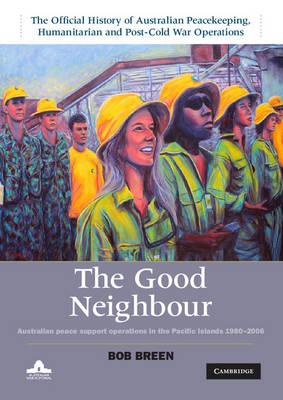Bob Breen has made another valuable contribution to the record of Australia’s military history in The Good Neighbour: Australian Peace Support Operations in the Pacific Islands, 1980–2006. This book is the fifth in a five-volume Official History of Australian Peacekeeping, Humanitarian and Post-Cold War Operations series. The Good Neighbour explores the Australian government’s efforts to support peace in the Pacific Islands from 1980 to 2006. It tells the story of the deployment of Australian diplomatic, military and policing resources at a time when neighbouring governments were under pressure from political violence and civil unrest.
The volume begins in 1980 with Australia providing logistic support to the new Vanuatu Government as it attempted, with help from Papua New Guinea, to deal with a secessionist rebellion on the island of Espiritu Santo. The story then moves on to examine Australia’s military response to the coup in Fiji in 1987 and the unrest in Vanuatu the following year.
The major part of the volume is devoted to Australia’s response to the conflict in Bougainville, Papua New Guinea’s most eastern island province. The Good Neighbour shows how Australia tried initially to keep out of the conflict, but eventually, in 1994, provided military support for an ill-fated peace conference. Then, after more conflict, the New Zealand Government revived the peace process and Australia played a major role, initially as part of the Truce Monitoring Group, and eventually led the unique multi-national Peace Monitoring Group (Operation Bel Isi) that served in Bougainville from 1998 to 2003. During that time over 3,500 Australian military personnel, police, and civilians served as unarmed peace monitors on the ground and offshore, in a remarkably patient and successful operation. At the same time, however, the prospects for instability in Papua New Guinea and elsewhere in the region presented challenges for defence planners in Canberra.
Before Operation Bel Isi had run its course instability occurred elsewhere in the Pacific, particularly in the Solomon Islands, where Australia deployed a peace-monitoring team in 2000, and especially in 2003 when Australia led the multi-national Regional Assistance Mission Solomon Islands (RAMSI) intervention.
When former Prime Minister John Howard, whose government mandated the Bougainville and Solomons operations, launched The Good Neighbour he said the rest of the world looked to Australia to take a lead role in peacekeeping in our part of the world, by reason of our economic strength, military expertise and capacity to project soft power. “It’s part of a tradition of Australia being a good neighbour,” he said, and reflected that “during just under 10-years of intervention, not one shot was fired by Australian peace enforcers is a testament to the intentions of the Australian armed forces and police to do no harm.” Howard also said that “the absence of serious civil unrest and political violence since the last intervention in 2006 is one of the Howard government’s enduring legacies and finest achievements. May the last 10 years of peace in the Pacific Islands continue forever.”
Granted full access to all relevant government records, Breen recounts the Australian story from decisions made in Canberra to the planning and conduct of operations. The Good Neighbour just under 500 pages in the main body and also includes a detailed chronology of events, a full list of abbreviations, a comprehensive index and two appendices. By comparison with the other volumes of the official history, the deployments described in this volume have a high level of involvement by the Australian Federal Police (AFP) and other civilian government officials. It includes an appendix describing how the AFP have been reorganised in recent years to deal with these challenges. Unsurprisingly, the bibliography is extensive and a valuable tool for future researchers in itself. The Good Neighbour includes a significant number of colour images and maps.
Associate Professor Bob Breen is Deakin University’s Director of Post Graduate Qualifications and Academic Adviser at the Centre for Defence and Strategic Studies, Australian Defence College. Beginning with books on Australian military operations in Korea and Vietnam, he went on to author several books about Australian peacekeeping operations in Somalia, Papua New Guinea (Bougainville) and East Timor in the 1990s, as well as an analysis of post-Cold War Australian military force projection entitled Struggling for Self-Reliance: Four Case Studies of Australian Regional Force Projection in the Late 1980s and the 1990s (2008).
I commend The Good Neighbour to those who seek a better understanding the context, complexities and challenges of multi-national and multi-agency operations in Australia’s immediate region.

Contact Marcus Fielding about this article.






